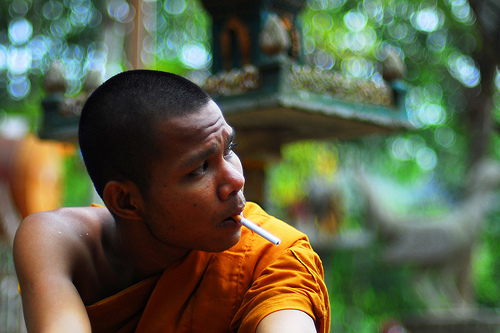- On Monday June 1st, Nebraska banned smoking in most public indoor places, and Japan also banned smoking on limited and express trains on Japan Railway Group.
- In May, North Carolina and Michigan banned smoking in public places.
- LA County plans to ban smoking in county parks within the next few months.
Smoking and tobacco sales have been totally illegal in the Buddhist nation of Bhutan since 2004. This factoid completely blows my mind.
(Photo from flickr).
Bhutan has been referred to as the Last Shangri-La, a heaven on earth (maybe much like the concept of Shambhala, but I am not well versed enough in the etymology to tell you for sure). Bhutan is a predominantly Buddhist nation. Tourists weren’t allowed in the country until relatively recently, and television was also banned until 1999. The reason for all these restrictions? For the well-being of the people, and to protect the environment and culture.
I don’t know if I could even picture an America where smoking was totally banned.
The fifth precept in Buddhism is to refrain from intoxicants. This is a gray area for 21st Century Buddhists. Having a drink or two or three, depending on who you are, doesn’t seem to be a big deal. We’re only concerned with actions and intentions that cause suffering to ourselves and others, right?
So the argument could be: if a person chooses to smoke, if it does not cause suffering, then it is not against the fifth precept, right? But what about second-hand smoke? If second-hand smoke causes cancer (as well as releases toxins into the environment), then doesn’t someone else’s decision to smoke cause suffering to others?
But then, if we’re going with that angle, then I shouldn’t ever eat a hamburger and I shouldn’t ever ride in a car or use detergent or bug spray or heating or electricity or buy anything new…
I suppose we have to pick our Buddhist battles. Plastic bags should be gone, we can mostly agree on that. We should recycle. We should conserve energy.
Would a nonsmoking nation be a more enlightened one?


